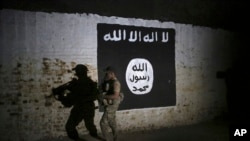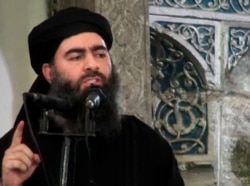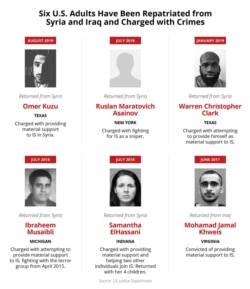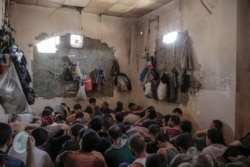Updated: Aug. 1, 2019, 8:11 p.m.
A dual American-Turkish citizen who left the United States as a teenager with his brother to join the Islamic State terror group has been brought back to his hometown to face terror-related charges.
Omer Kuzu appeared in a Texas courtroom Thursday charged with conspiring to provide material support to IS, according to the U.S. Justice Department.
Officials said Kuzu, now 23, was captured along with about 400 IS fighters by U.S.-backed Syrian Democratic Forces near the village of Dashisha in March, after fleeing with IS fighters as the terror group's self-declared caliphate in Syria ultimately collapsed.
According to prosecutors, Kuzu, who was born and raised in Dallas, left the U.S. in October 2014 with his brother, bound for Istanbul, Turkey. Several months later, they were smuggled into Syria. Kuzu said he was then taken to Mosul, Iraq, for weapons training and pledged allegiance to IS leader Abu Bakr al-Baghdadi upon his return to Syria.
Family pleas
Court documents indicate Kuzu and his brother rejected pleas from his parents who traveled to their native Turkey to try to dissuade the two from traveling to Syria. Family members also sought help from Turkish authorities and advised U.S. officials of the situation.
FBI agents allege that while in Syria, Kuzu worked with the IS telecom directorate, receiving a monthly salary of $125 to repair communications equipment for the terror group's front-line fighters.
Kuzu also told FBI agents he had married a 16-year-old IS bride from Algeria and they had a child together.
The fate of his wife and child, and of his brother, is not clear from the court documents.
Kuzu faces up to 20 years in prison if convicted.
Kuzu is the sixth U.S. citizen or permanent resident to be indicted in the United States on charges of supporting IS overseas.
Two weeks ago, the U.S. repatriated 42-year-old Ruslan Maratovich Asainov, a naturalized U.S. citizen from Brooklyn, New York, and charged him with being an IS emir, responsible for establishing training camps for IS recruits and for teaching them how to use weapons.
Four other U.S. citizens — three men and one woman — who left the country to join IS have also been brought back to face charges.
Mohamad Jamal Khweis of Alexandria, Virginia, who was brought back from Iraq in June 2017, has already been convicted.
Additionally, two women and their six children were repatriated to the U.S. this past June, though they have not been charged with any crimes.
Foreign fighters
Since the collapse of the Islamic State's physical caliphate in Syria this past March, Syrian Democratic Forces have been holding an estimated 2,000 foreign fighters from more than 50 countries in makeshift prisons.
U.S officials have repeatedly pleaded with countries involved in the fight against IS to repatriate their citizens and prosecute them, with varying degrees of success. But Western European countries, especially, have been reluctant to do so.
"These fighters are dangerous, battle-hardened terrorists," State Department Counterterrorism Coordinator Ambassador Nathan Sales told reporters Thursday.
"We all have an obligation to keep them from ever returning to the battlefield," he added. "The most effective way to do that is for countries of origin to take back their citizens and prosecute them for crimes they've committed."
SDF officials have also been urging countries to take back their foreign fighters, noting that their facilities and resources have been strained by the number of IS prisoners in their custody, in addition to having to care for tens of thousands of IS-affiliated women and children, some of them wives and children of foreign fighters.
There are no official estimates for how many of the IS prisoners were U.S. citizens or residents. But in comments to VOA this past June, Kurdish officials suggested more Americans were in custody.
"American citizens services cases in Syria are extremely complicated due to the lack of consular access to the facilities where they are," a State Department official told VOA Thursday. "The department is looking into these cases, but we will not comment on them publicly due to privacy and security considerations."
"The United States will continue to repatriate and, when appropriate, prosecute its citizens, as we have done in the past," the official added.
Independent research by The George Washington University's Program on Extremism has identified 80 U.S. citizens or residents who traveled to Syria or Iraq to join extremist groups since 2011, 75% of whom aligned themselves with IS.











